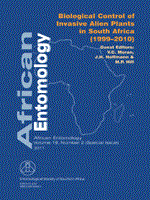This paper provides a brief review of the environmental and economic costs of invasive alien plants in South Africa as a background to assessments of returns on investment in weed biological control. The understanding of impacts and their economic costs is far from perfect, but estimates indicate that some costs (of lost water, grazing and biodiversity) are currently about R6.5 billion per annum (about 0.3 % of South Africa's GDP of around R2000 billion: R7 = about US$1), and could rise to > 5 % of GDP if invasive plants are allowed to reach their full potential. By comparing the costs of biological control research and implementation to the benefits of restored ecosystem services, or avoided costs, and avoided ongoing control costs, biological control has been shown to be extremely beneficial in economic terms: estimated benefit:cost ratios ranged from 8:1 up to 3726:1. Currently, spending on biological control is far lower than on other forms of control (about 5 % and 14 % of that spent on mechanical and chemical control, respectively), despite the significantly better returns on investment from biological control. In aggregate these assessments indicate that higher levels of spending on biological control research would generate extremely attractive returns on investment.
How to translate text using browser tools
1 August 2011
The Costs and Benefits of Biological Control of Invasive Alien Plants in South Africa
B.W. van Wilgen,
W.J. De Lange
ACCESS THE FULL ARTICLE
It is not available for individual sale.
This article is only available to subscribers.
It is not available for individual sale.
It is not available for individual sale.

African Entomology
Vol. 19 • No. 2
August 2011
Vol. 19 • No. 2
August 2011
benefit:cost ratios
ecosystem services
water resources




